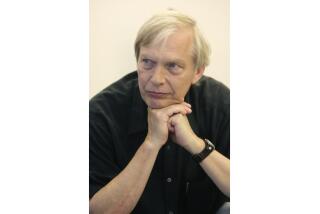Question Authority? He’d Settle for a Little Curiosity From the TV Generation
- Share via
Last week I thanked God that I grew up with radio instead of television.
I had a guest speaker at my undergraduate UC Irvine writing class. Arnold Hano is not only a friend but a class act. He has been writing books and magazine articles for major New York publications for more than four decades. He has been deeply involved in local political and social movements. He has a play awaiting production. He wrote the earliest--and one of the best--nonfiction baseball books, called “A Day in the Bleachers.” He is a spirited and funny raconteur. And a delightful human being.
So he agreed to come and visit with my students. He is director of internal publications for Pacific Mutual, and he’s busy. Turning over half a morning to my students wasn’t frivolous. He did it because he is interested in young people and eager to share that part of his experience and history that is most useful to them.
The day before he arrived, I went deeply into his background with my students so they would know his areas of expertise and where to direct their questions. I can’t pay my guest speakers, so I don’t ask them to prepare a talk, only to donate their time on the premise that questions--especially because the speaker’s experience relates so directly to the subject matter of the class--would keep the session lively and vigorous.
Well, I’ve been here before, and I should have known better. For an hour and a half, I interviewed Arnold, he told stories and we both looked with growing despair at the class, waiting for the questions. Several times Arnold said to them, “What do you want to talk about? Tell me. That’s why I’m here.” The direct plea would produce a desultory question or two, then silence.
It occurred to me several times that instead of breaking the silence, we both should have simply sat there mute, letting the discomfort wash over the audience. It probably wouldn’t have worked--and neither of us were capable of it, anyway.
I apologized to Arnold when it was over, and he said only that this was the lowest energy level he’d ever experienced in a group. I told them that the next day, then made a mildly hysterical speech, chewing them out for their insensitivity and demanding to know how they could have been foolish enough to pass up this opportunity for knowledge and enlightenment. They were astonished. They thought the session had gone off quite well. They learned a lot, they told me.
It was only then that I realized what had been taking place. They were watching a TV show. A talk show. I was the host and Arnold was the guest. They could sit passively in their seats--as they’ve done through two decades of watching TV--and watch the show. Good show. They’d like to tune it in again sometime. So what’s the big deal?
That’s when I thanked God I grew up with radio.
Radio was a participatory medium. All we had were voices coming out of a little box, plus some sound effects. A creaking door. Hoofbeats. Footfalls in a corridor. Heavy breathing. We had to supply the rest.
So we learned how to take four or five people standing around a microphone with a sound effects man in a radio studio and project them into the wildest, scariest, most romantic kinds of adventures. We had to be on the football field with Jack Armstrong or ambushed with the Lone Ranger or watching the clutter fall out of Fibber McGee’s closet. If we didn’t participate, we had nothing. So we grew up being participants in life rather than primarily observers.
I know that’s a dreadful generalization, and I hate generalizations, but I’ll stick by it nonetheless. I’ve had many similar experiences with college students. A few years ago I taught a class on the impact of motion pictures on American society. In the process, I delivered up guest speakers such as Jack Lemmon, Robert Wise, James Earl Jones, Frank Capra and Jack Nicholson, among others--with approximately the same results as my recent experience with Arnold Hano. It caused me, finally, to give up the class.
I know that TV is an easy target, but that shouldn’t dissuade us from looking at the profound effects it has on the young people who grow up with it. Or to be eternally grateful that we had to contribute a large part of ourselves in order to extract entertainment from radio.
That involved no particular virtue on our part. It was just an accident of history that I think made life a lot more salubrious for those of us who did it. Heigh-ho, Silver.
More to Read
Sign up for our Book Club newsletter
Get the latest news, events and more from the Los Angeles Times Book Club, and help us get L.A. reading and talking.
You may occasionally receive promotional content from the Los Angeles Times.









